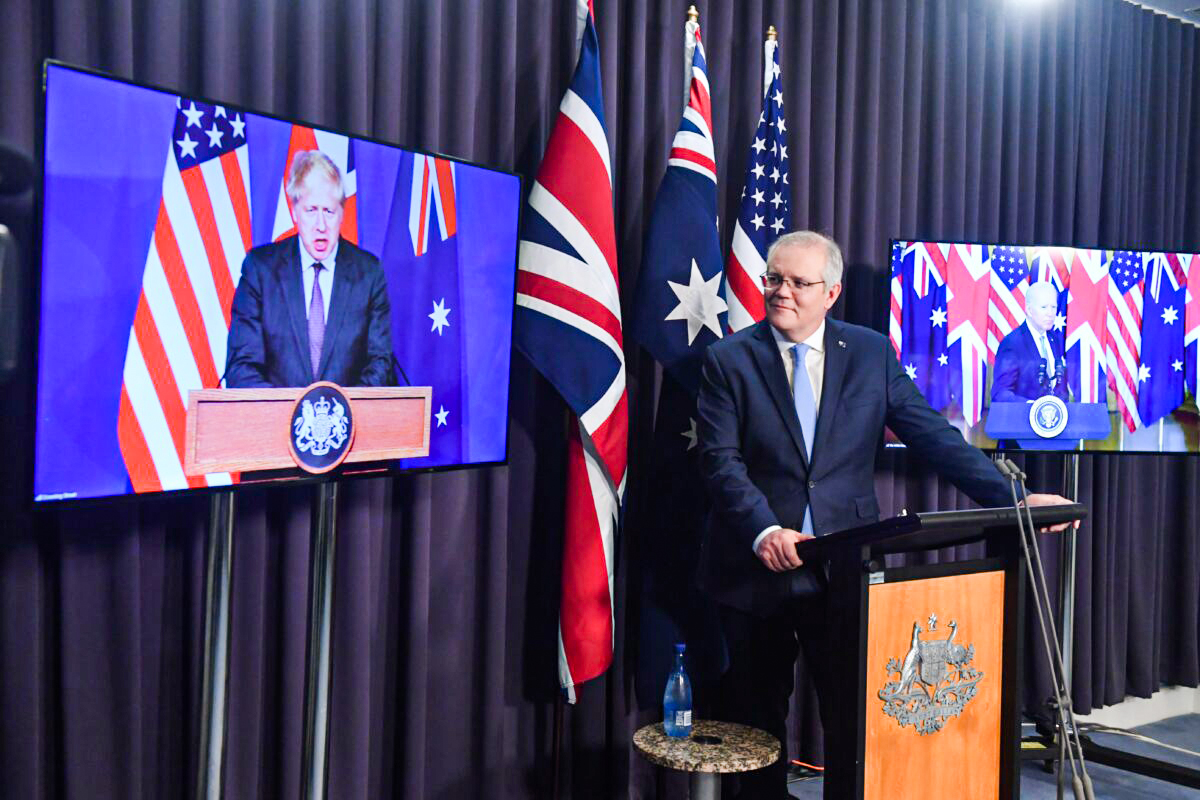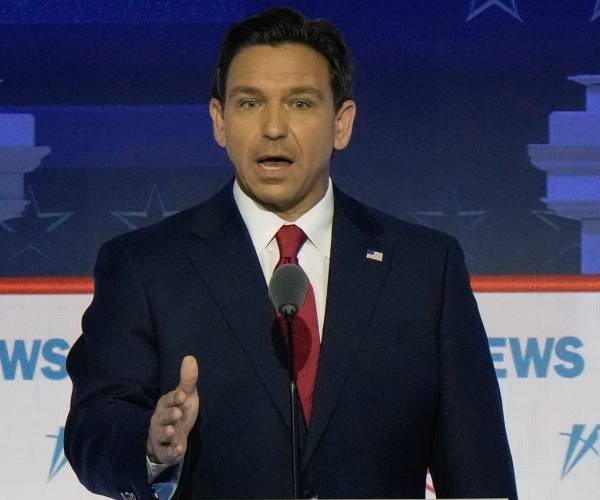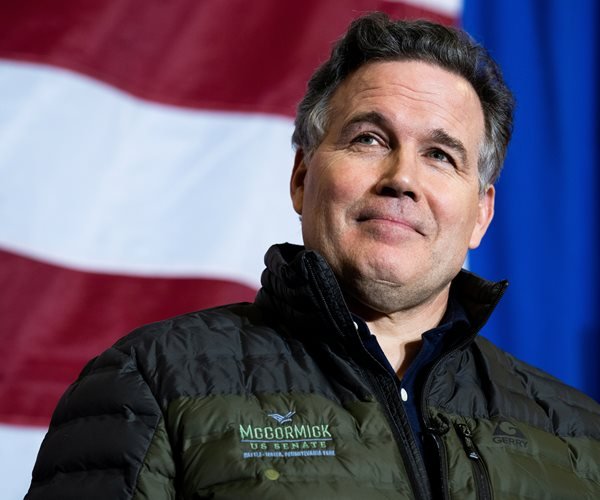Britain’s Leadership Change Has Profound Implications for the New AUKUS Alliance
Distressed Patriotic Flag Unisex T-Shirt - Celebrate Comfort and Country $11.29 USD Get it here>>

Commentary
The UK’s decision to change its prime minister on Oct. 24 pushed it toward another crossroads: whether to pursue Britain’s revival of global trade, prestige, and influence or retire once again to the role of middling power.
The recent path toward a revival of “global Britain,” matched by the dawn of a new monarchical era with the passing of Queen Elizabeth II, had been heralded by many as a glimmer of hope that the West still had some potential to revive its influence and moral stature.
The selection of former Chancellor of the Exchequer Rishi Sunak as the next leader of the Conservative Party—and therefore as the next British prime minister—seems likely to set the UK on a path to only modest economic and strategic growth over the coming few years. This will have a significant impact on the path of the major new global alliance that the UK entered in September 2021: the Australia-UK-United States (AUKUS) pact.
All three AUKUS members are firmly embarked on paths toward more statist and globalist governance. They are therefore committed to economic policies more status quo than reformist in agenda. In other words, all three governments are committed to state-dominated economies and the perpetuation of globalist agendas, even at a time of global economic downturn and conditions that doom the viability of globalized—rather than bilateral—trade arrangements.
Two of the three AUKUS states—the United States and the UK—are firmly focused on a Euro-Atlantic agenda. That leaves Australia as the most exposed Indo-Pacific power, concerned overwhelmingly with facing a hostile Chinese regime. Clearly, the incoming Sunak government will continue to commit to global trade, now that the UK has left the European Union (EU), but will not pursue the global trade agenda of the past two Conservative prime ministers, Boris Johnson and Liz Truss.
Johnson and Truss (even when Truss was a Cabinet minister, before becoming Prime Minister) were aggressive proponents of global trade deals for Britain and advocated for the UK’s participation in AUKUS.
Much of the path of the Sunak government is expected to be cautious. The new prime minister has little wish to disturb the political situation further while he attempts to establish calm. Therefore many Cabinet appointments made by Truss’s 49-day government may be retained, probably including the new chancellor of the exchequer, Jeremy Hunt. However, Hunt, who is committed to a retained UK presence in the EU, may clash with Prime Minister Sunak.
Moreover, Defence Secretary Ben Wallace—who has remained a quiet, steadfast, and strong advocate for the UK’s improved global strategic posture—threatened to resign if the new government could not commit to the goal of committing three percent of GDP to defense. This is the litmus test for the new administration. Wallace, who had been seen as a “safe pair of hands” to challenge for the Conservative Party leadership when Boris Johnson resigned, has shown no personal ambition for party leadership.
Wallace has been happy to commit to his defense mission of achieving a long-term revival of the UK’s strategic posture. That includes pushing for a third aircraft carrier strike group built around a much larger, and possibly nuclear-powered carrier (CVN), as well as an increase in surface and submarine fleets, a larger British army, and a more independent (from the United States) air power and space capability.
Significantly, a major indicator of whether the Sunak government will continue the “global Britain” posture begun by Boris Johnson, will be seen in whether the UK will tone down its almost pathological commitment to maintaining its proxy war with Russia, using Ukraine as the proxy. The irony of the Johnson and Truss administrations was that they were attempting to be committed to Britain’s global strategic projection in defense and foreign policy, while simultaneously distracting the UK economy and armed forces into the war against Russia.

The outgoing Truss government was committed to kick-starting the UK economy, but the inexperience of both the prime minister and Chancellor of the Exchequer Kwasi Kwarteng mean that their initial budget was presented with little regard to the optics. Had it been better shaped, it would have avoided the resulting panic in the marketplace and the necessity for the Bank of England to intervene.
Truss had little option but to backtrack on her budget decisions and to dismiss Chancellor Kwarteng, regardless of the fact that it appeared to show a lack of resolve: the Bank of England had announced on Oct. 14 that it would end the support scheme for government debt (gilts). That would have led to a collapse of sterling if the prime minister had not reversed the tax reduction policies of her mini-budget. Doing so, however, meant that she had lost the credibility to govern.
Thus, the Bank of England essentially forced Truss from office. In the run-up to the collapse, Home Secretary Suella Braverman announced her own resignation from the Cabinet on Oct. 19, after Braverman was attacked for breaching rules by sending an official document from her personal email account. She used her resignation letter, however, to criticize Prime Minister Truss, saying she had “concerns about the direction of this government.”
Prime Minister Sunak, if he is to lead the Conservative Party to election victory in 2024, cannot afford any missteps. He must stabilize the government and placate the Bank of England and the trading community. At the same time, he must offer incentives to revive foreign investment and confidence in London as a global financial center. Further, he must ensure the decentralization of the economy to northern England and Scotland (in particular).
Sunak must also reassure much of the electorate, particularly in the north of England, that he is not just another London financial figure. He must revive the hopes of working Britons: that manufacturing and wealth will continue to be restored to their areas and to Scotland, Wales, and Northern Ireland.
He lost his first bid for the premiership because he did not seem committed to a low-tax economy and to the importance of Britain’s manufacturing base outside London.
To revive the momentum for a “global Britain,” begun by Johnson and Truss, Sunak must also signify a commitment to the Commonwealth—the UK’s unique global influence vehicle—and to AUKUS.
This means cooling the UK’s leadership position in the U.S.-dominated proxy war on Russia. The first “Cold War”—1945 to 1991—was caused not just by the existence of a threat to the West from the USSR, but by the combined Sino-Soviet threat. The 1972 visit to Beijing by U.S. Pres. Richard Nixon began to break that apart, by peeling Beijing from Moscow. However, many “old cold warriors” in the West were reluctant to believe that “the Russians” (as they insisted on erroneously calling the USSR) were not somehow represented by post-Soviet, anti-communist Russia.
Now the old cold warriors of the West have driven post-Soviet Russia into the arms of the Chinese regime. A new generation will, if the West retains any cohesiveness, have to sooner or later attempt to pry Moscow once again from Beijing. Continuing Boris Johnson’s personal commitment to a relentless war against Russia, via Ukraine, only compounds self-inflicted injury upon the UK and the West.
Meanwhile, the new monarchy under King Charles III has already begun the task of reassuring much of the Commonwealth and allies in Africa that the UK’s friendship continues, and could be extended.
One of the King’s first tasks was to meet Democratic Republic of Congo (DRC) President Félix Antoine Tshisekedi Tshilombo at Buckingham Palace. Tshisekedi asked the King to use his influence within the Commonwealth—and with Rwanda, in particular—to put an end to destabilizing actions in eastern DRC and to promote peace, security, and stability in Africa’s Great Lakes. Significantly, the DRC is not a member of the Commonwealth, but Rwanda is.
The Countess of Wessex separately undertook an extensive visit to Africa in October, shortly after the reign of King Charles began. She visited the DRC, Botswana, Malawi, and Ethiopia (seat of the African Union) as well.
The government of Prime Minister Truss was not ready to launch new global diplomacy at that time, but the King was ready to do so, without crossing government prerogatives.
The Crown and the new Sunak government will soon tackle the really difficult strategic challenges to Britain’s prestige and influence. Britain needs to show that it remains committed to improved trade with its Caribbean Commonwealth members, who suffered badly when the UK entered the EU. It will also need to reassure Australia, New Zealand, and the Indo-Pacific Commonwealth societies, at a time when they are uncertain about Britain’s commitment to the “global Britain” path which Johnson revived.
The bottom line is that NATO remains a legacy and an alliance of diminishing importance for the UK, while AUKUS offers a future-oriented global alliance.
There were rumors that the new Sunak government would back Johnson for NATO secretary general—replacing the overreaching and inept Jens Stoltenberg. The appointment would probably allow the former prime minister to continue to indulge his anti-Russian penchant.
However, a measure of the Sunak Government will be its commitment to AUKUS and global Britain.
Views expressed in this article are the opinions of the author and do not necessarily reflect the views of The Epoch Times.





